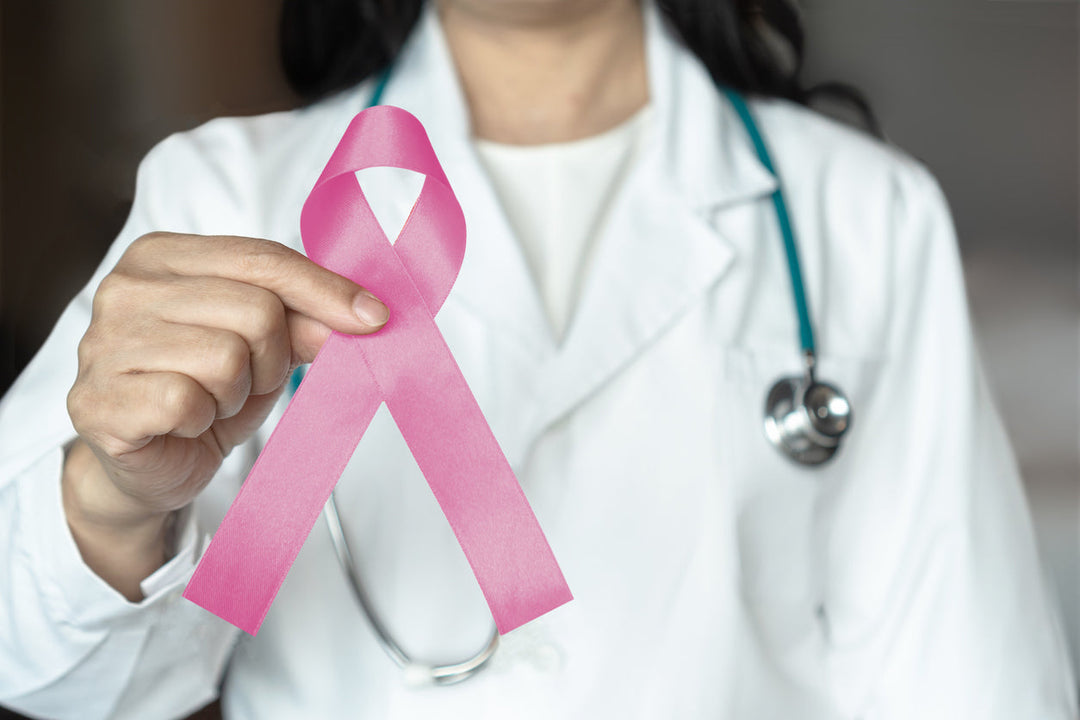Medical Menopause and Breast Cancer: What You Need to Know
When most of us think of menopause, we picture a natural life stage that arrives gradually as the ovaries slow down and eventually stop producing hormones. But for many women, especially those who have been treated for breast cancer, menopause can come much earlier — and more abruptly — than expected. This is what’s called medical menopause, and it can feel very different from the natural transition.
To help demystify this topic, we spoke with Dr. Somi Javaid, a board-certified OB/GYN, menopause expert, and Stripes Advisory Board member, about what medical menopause means, how it intersects with breast cancer treatment, and what options women have for navigating symptoms safely and effectively.
What is medical menopause?
In short, medical menopause is menopause triggered by treatment rather than natural ovarian aging. As Dr. Somi explains: “Because it happens over a much shorter window, the hormonal drop is abrupt — and symptoms often present more intensely and earlier than in natural menopause.”
This sharp decline in estrogen and other hormones can be brought on by different medical treatments, many of which are commonly used in breast cancer care:
-
GnRH agonists/antagonists (such as leuprolide) temporarily suppress ovarian hormone production.
-
Oophorectomy (surgical removal of the ovaries) causes immediate menopause.
-
Chemotherapy and radiation can damage ovarian follicles, leading to temporary or permanent ovarian failure.
-
Endocrine therapies (like aromatase inhibitors) lower systemic estrogen as part of cancer treatment.
In all these cases, the body experiences a sudden change in hormones, which often means hot flashes, night sweats, mood shifts, and genitourinary symptoms show up quickly — and sometimes with more intensity than in natural menopause.
Menopause and breast cancer: what’s reversible?
One of the big questions women facing breast cancer treatment have is whether these changes to their fertility and hormone status are permanent. The answer: it depends on the treatment.
Here’s how Dr. Somi breaks it down:
-
Chemotherapy: Ovarian function may or may not recover. The likelihood of recovery declines with age and depends on the specific drug regimen.
-
GnRH analogs: Ovarian suppression is usually reversible after stopping the medication.
-
Aromatase inhibitors: These drugs lower estrogen levels while you’re on them, so symptoms depend on the duration of therapy.
-
Oophorectomy: Surgical menopause is immediate and permanent — there’s no going back.
The unpredictability of recovery can make this journey emotionally and physically challenging. Some women may regain menstrual cycles after treatment, while others may not. Having a clear understanding of what’s likely in your situation can make it easier to plan ahead and seek the right support.
Why medical menopause feels different
Natural menopause usually unfolds over years. Hormones fluctuate, then decline, giving the body some time to adjust. In medical menopause, that window of adjustment is shortened or disappears altogether.
The result? Symptoms often hit harder and sooner. Common complaints include hot flashes and night sweats that disrupt sleep, mood changes or brain fog, vaginal dryness, pain with sex, and urinary issues, bone loss and muscle weakness, lower libido and changes in sexual health — basically the same laundry list that develops over the decade timeframe of perimenopause.
The suddenness can feel jarring, but there are effective ways to manage symptoms, even for women with a breast cancer history.
Managing symptoms after breast cancer
Treatment options for menopause symptoms are always individualized, but this is especially true for women who have had breast cancer. As Dr. Somi emphasizes, “decisions about hormone therapy are curated and individualized by the patient with their oncology and menopause clinicians.” In other words, what’s safe for one person may not be right for another. Here are some of the most common options to explore with your healthcare team:
Localized Hormone Therapy for GSM
For symptoms like dryness, irritation, and painful sex, low-dose vaginal estrogen or vaginal DHEA can often be considered. These are applied locally, meaning the hormones act primarily in the vaginal tissues and typically don’t raise systemic estrogen levels. Using these therapies consistently, along with high-quality moisturizers and lubricants, can make a big difference in comfort and sexual health.
Nonhormonal Prescription Medications
Hot flashes, night sweats, bone health issues, and sleep disturbances can sometimes be managed with nonhormonal prescription drugs. There are also FDA-approved medications for low libido and sexual health, which may be an option depending on your history and needs.
Devices and Procedures
Some women benefit from physical therapy or procedural options, such as pelvic floor physical therapy and biofeedback or vaginal dilators for elasticity and comfort.
Lifestyle Approaches
Lifestyle shifts can help reduce the intensity of symptoms and improve overall well-being.
-
A progressive resistance training and weight-bearing exercise routine can help support bone and muscle health.
-
Mediterranean-style nutrition rich in protein and omega-3 fatty acids
-
Cognitive behavioral therapy (CBT) for managing hot flashes and insomnia
-
Breathing and relaxation techniques (like paced respiration)
-
Cooling strategies such as layered clothing and fans
-
Alcohol and caffeine moderation, which may reduce hot flash frequency and severity
The emotional side of medical menopause
Medical menopause isn’t just a physical experience — it’s an emotional one, too. For women who’ve already been through the stress of a breast cancer diagnosis, the sudden arrival of menopause can feel like another curveball. Grief, frustration, and uncertainty are normal.
Acknowledging these feelings and building a supportive care team can make a world of difference. This might mean talking openly with your oncologist, seeing a menopause specialist, joining a support group, or simply leaning on trusted friends and family.
And as Dr. Somi reminds us, there’s no one-size-fits-all solution: “Managing symptoms with a cancer history is always a personalized decision. The best approach is one that’s made together — with your oncology team and menopause clinicians — based on your body, your treatment history, and your goals.”










